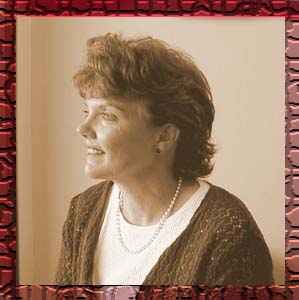![[Metroactive News&Issues]](/gifs/news468.gif)
[ San Jose | Metroactive Central | Archives ]

Bionic Woman With a microprocessor implant, a San Jose woman learns to hear again By Jessica Lyons CINDY BUTLER, a determined business woman with brown curly hair, smiling eyes and a ski-jump nose, throws up her hands in anticipation, her mouth open and eyebrows raised. Her smile's hopeful, but nervous. It's a sunny Friday morning, and Butler's hoping that today she will get her hearing back again. About a month ago, Butler, 43, underwent surgery at O'Connor Hospital to correct the hearing she lost when she was 10. The surgeon implanted a tiny computer and a magnet under the skin above her left ear, and then inserted a stringy electrode array into her inner ear. She's the first San Josean to receive a cochlear implant, and one of about 28,000 people worldwide. Today, the implant will be "turned on" and Butler can't help but hope her bionic ear will do for her what it did for Jamie Summers. Butler will have to wear a microphone headpiece that magnetically attaches to the implant and also a speech processor, a pocket-sized microcomputer that converts incoming sound into electrical codes and sends these codes to the hearing nerves in her brain. Without the device, Butler can hear loud noises, but unless she's lip reading, the sounds are unintelligible to her. It's been that way since she was in grade school. Deafness runs in her family--Butler's mom, sister and brother all suffer from serious hearing loss. All began wearing hearing aids at about age 5. They all read lips, however, and Butler speaks clearly. It's hard for onlookers to tell that her hearing is impaired. "I don't want to sound like I'm deaf," she says. "I want to do better. I want to sound clear." Once the implant is "opened," the first noises Butler will hear will be audio pulses of varying intensity and pitch. Husband Don, 3-year-old daughter Amy, surgeon Jennifer Maw, a team of audiologists from the Hearing Institute and an Advanced Bionics rep will be the first to see Cindy hear. And one lucky reporter. "Let's party," Butler says, and the beeps start rolling. The room falls silent except for the sound emanating from the computer monitor. At first Butler can't hear them, but as the pitch rises, her eyes widen and she nods her head. Clinical audiologist Philip Ives asks Butler how the volume sounds. "I don't want to blast you," he says. "I want to go all the way up to the edge," she responds, clapping. She never complains that the sounds are too loud. Ives stops the test to recalibrate the device. The next time he turns it on, he says, Butler will be able to hear speech. Does she want to take a break first? She doesn't. She waits expectantly, and so Ives turns on the device and speaks to her. "Can you hear me?" he asks. All she hears are loud, high-pitched beeps. She's not waiting for quite the radical transformation that I am, but frustrated tears suggest she had expected more. "I'm just so anxious," she says. The mood in the room has changed from joyous expectancy to somber realism. This is normal, the doctors assure her. Cindy Butler hasn't heard high-frequency sounds for nearly 40 years. Her brain simply doesn't remember how to understand speech. The procedure is no magic trick. There's no bright red switch to flip. And I guess I was expecting something more dramatic, like watching Butler listen to her husband say "I love you" for the first time with her eyes closed. Apparently, so did she. "I can hear myself beeping as I talk, but I can't understand a single word," she says about the implant. "It's so hard to explain what I'm hearing. I expected it to be clearer, easier. I never thought it would be this ... weird." After three hours, voices sound slightly clearer to Butler, and she begins to cheer up. "You're going to have to talk to me a lot," she tells her husband. "I need practice. You have such a nice voice, so calm." Butler will return to the Hearing Institute in two weeks for a follow-up visit. In three months' time, the doctors tell her, most patients reach 70 percent audio understanding without lip reading. Butler grimaces when the doctors tell her she won't be able to hear on the phone for "months and months." Maybe never on a cell phone. And music, except familiar songs, will most likely sound like noise. After nearly five hours at the clinic, Butler's exhausted. But she doesn't want to give up. "Who wants to talk to me?" she asks. It's more an order than a question. "Say something to me," Ives says. "So, are you married?" Butler quips. She's still reading his lips. [ San Jose | Metroactive Central | Archives ]
|
From the October 28-November 3, 1999 issue of Metro, Silicon Valley's Weekly Newspaper.
Copyright © 1999 Metro Publishing Inc. Metroactive is affiliated with the Boulevards Network.
For more information about the San Jose/Silicon Valley area, visit sanjose.com.